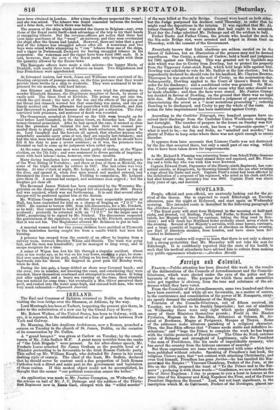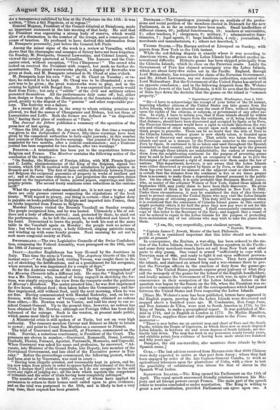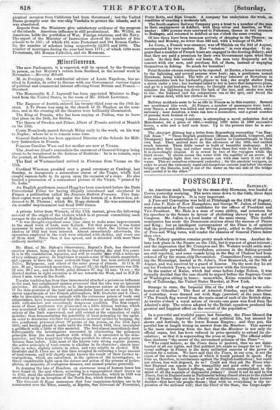lartigu nut tulunial.
FirAms.—Public attention has been directed this week to the results of the deliberations of the Councils of Arrondissement and the Conseils- , Generaux, which were elected under the eyes of the police and the bayonets of the army. The purpose for which these mock assemblies were got together is obvious, from the tone and substance of the ad- dresses which they have voted. From the Councils of the Arrondissements, some two hundred and three have been received; and while all are favourable, as a matter of course, to the continuance and consolidation of the power of M. Bonaparte, sixty- six openly demand the establishment of the Empire.
Fourteen of the Conseils-Generaux, out of fifteen received on Tuesday, are declared to be frankly Imperialist ; but out of nineteen on Wednesday there were only eight which spoke plainly. Over many of these Ministers themselves preside ; Fould in the Hautes Pyrenees, Magma in the Bas-Rhin, Abbatucci at Orleans, St. Ar- naud at Bordeaux, Magne at Perigueut Maupas at Troyes. Some of the addresses make allusions partaking of a religious character. Thus, the Bas-Rhin affirms that "France needs stable and definitive in- stitutions," and "begs the Prince to complete the work he has begun with the visible protection of Providence." The Cates du Nord, extreme point of Britanny and stronghold of Legitimacy, calls the President "the man of Providence like his uncle of imperishable memory, who has saved the country from the hideous excesses of anarchy." But these expressions are tame when compared with some which have been published without rebuke. Speaking of Proudhon's last book, the religious Univers says, that "not content with attacking Christianity, and even God himself, Proudhon has gone farther—he has insulted the Em- perorund the Empire ! " Viscount Chiunbran, Prefect of the Jura, at the fate on the 15th, proposed the toast of "To the Prince and to the Em- peror " ; prefacing it with these words—" Gentlemen, we now celebrate the fete of Saint Napoleon : I rise to propose to you a toast in honour at the same time of the Emperor and King Napoleon the First, and of the Prince President Napoleon the Second." Last, but not least significant, is the inscription which M. de Calvimont, Prefect of the Dordogne, placed un- der a transparency exhibited by him at the Prefecture on the 15th : it was written, "Dieu a fait Napoleon, et re repose!"
General Magna; President of the Conseil-General at Strasbourg, made an important statement at the late meeting of that body. He said that the President was organizing a strong body of reserve, which would allow of a diminution in the number of the troops, and a consequent de- crease of taxation. Ile professed to have derived this information from M. Bonaparte personally, just before the General left Paris.
Among the minor signs of the week is a review at Versailles, which shows that the champagne and sausages of Satory have not been forgotten. On Sunday, M. Bonaparte, General Lowcestine, and Colonel Isnard, re- viewed the cavalry quartered at Versailles. The Lancers and the Cuir- assiers cried, without exception, " Vive rEmpereur I " The crowd who looked on received the President with respect, but made no further de- monstration. The grand waterworks played, a display of fireworks was given at dusk, and M. Bonaparte returned to St. Cloud at nine o'clock. M. Bonaparte kept his own "fête" at St. Cloud on Tuesday ; or ra- ther, he ordered it to be kept. St. Cloud was to be illuminated ; a con- cert was to be given ; the great waterworks were to play, and in the evening be lighted with Bengal fires. It was expected that crowds would flock from Paris ; but only a rabble" of the civil and military orders presented themselves. All the performances duly came off; but, either from design or from spite, the illumination at the fountains suddenly ex- pired, greatly to the disgust of the " gamins " and other respectable per- sons. The festivity was a failure. In a recent list of officers in the army to whom retiring pensions are allowed, we find the names of Changarmer and Bedeau, but not those of Lamorieiere and Lefl6. Both the former are defined as "en disponibi- lite," having their place of residence at "Paris." The Journal des Ddbais publishes a summary of the operation of the press-law of last spring. "Since the 10th of April, the day on which for the first time a warning was given to the Inde:pendant de 'Guest, fifty-three warnings have been given by the competent authorities to forty-eight journals; in this number four journals of Paris figure for five warnings. One journal of Paris has been suspended for two months, after a judicial condemnation ; and a Toulouse journal has been suspended for two months, after two warnings."
Emu-rms.—A termination has been put to the negotiations between Belgium and France. The Mon iteur contains the following notice of the conclusion of the treaties-
" On Sunday, the Minister of Foreign Affairs, with MM. Firmin Rogier and C. Leidts, plenipotentiaries of the King of the Belgians, signed two treaties, which will be received with equal satisfaction by public opinion in Brussels and in Paris. The first of these ratifies definitively between France and Belgium the reciprocal guarantee of. property in works of intellect and art ; and at the same time reduces to a lust proportion the respective duties imposed on the importation of books, panted papers, engravings and litho- graphic prints. The second treaty sanctions some reductions in the customs tariff."
What the precise reductions sanctioned are, it is not easy to say ; and there are only guesses current respecting the stipulations of the book treaty. With regard to piracy, one thing is certain—that a higher duty is payable on books published in Belgium and imported into France, than on books imported from France to Belgium. Marshal Haynau visited the Brussels Vauxhall on Sunday evening. The people recognized him, and he was hooted. Ultimately a file of sol- diers and a body of officers arrived ; and, protected by these, he staid out the performances. As he left the concert., he was followed and hissed to his hotel. Determined to brave the people, he took his seat at the same table in the Vauxhall again. on Monday : the people took no notice of him ; but when he went away, a body followed, singing patriotic songs, and winding up with some hearty groans. Next morning he set out to seek more congenial society at Paris.
SWITZERLAND.—The two Legislative Councils of the Swiss Confedera- tion, composing the Federal Assembly, were prorogued on the 18th, until the 18th of January next.
ITALY.—Another Englishman has been ill-used by the Austrians in Italy. This time the scene is Verona. The Augsburg Gazette of the 14th instant says—" An English lord, visiting Verona, was caught there in the act of sketching the fortifications, and as a punishment for his arrogance, when arrested, he was imprisoned for a couple of days." So far the Austrian version of the story. The Turin correspondent of the Morning Chronicle tells a different tale. He says the "English lord" was a Mr. Newton ; who, instead of being engaged in sketching the for- tress, was simply enjoying the view from the ramparts under the guidance of Murray's Handbook. The sentry arrested him ; he was first imprisoned
for five hours, without food ; then taken before the Co ; and fur- ther imprisoned, still without food, until the next morning, when he was set free. Having communicated with Marshal Radetzky' and, on his re- ference, with the Governor of Verona,—and having obtained no redress from either,—Mr. Newton went to Venice and told his story to our re- sident Consul-General. Up to the present lime, however, no redress has been obtained by Mr. Newton - although our Foreign Office has been duly informed of the outrage. Such is the version, at present made public, which seems most likely to be correct.
A Ministerial crisis is still spoken of at Turin but not on very high authority. The rumours mention Cavour and likazzi as likely to return to power • and point to Count San Martino as a successor to Pernati
The trial of Guerrazzi and Romanelli, at Florence' commenced on the 16th. Nervini, a notorious reactionary, is President of the Court. The prisoners are eleven in number,—Guerrazzi, Romanelli, Dami, Lottrini, Cimballi, Piccini, Petracci, Agostini, Pantanelli, Montazio, and CapecchL When Guerrazzi was asked his name and profession, he answered, "Ad- vocate, late Minister of the Grand Duke, late Deputy, late member of the Provisional Government, and late chief of the Executive power in Tus- cany." Before the proceedings commenced, the following protest, which had been sent in by Guerrazzi was read in court- " Having been illegally arrested, and treasonably kept in prison, and be- ing now taken from ytison in order to appear before the tribunal of the Royal Court, I declare that I yield to compulsion, as I do not recognize in the said court any right of judging me • all the laws which regulate the competence Of tribunals and the order of dials having been completely infringed.'
The number of witnesses is 359; several of whom have applied for permission to return to their homes until called upon to give evidence; and as the trial was postponed to the 26th, and is likely to last a very long time, their request has been granted.
DEYMARK.—The Copenhagen journals give an analysis of the profes- sions and social position of the members elected in Denmark for the new Parliament, in so far as returns have been made. Small landholders of different classes, 30 ; judicial functionaries, 10 ; teachers at universities, 9 ; other teachers, 9 ; clergymen, 9 ; military, 7 ; edntinistrative func- tionaries, 7 ; legal agents, b ; large landholders, 4 only ; journalists, 3; merchants and manufacturers, 4 ; others not described, 5.
Unman STATES.—The Europa arrived at Liverpool on Sunday, with papers from New York to the llth instant.
While the cod-fishing dispute is exactly where it was according to American views, the guano on the Lobos Islands has afforded another in- ternational difficulty. Hitherto guano has been shipped principally from the Chincha Islands, which lie close on the Peruvian coasts. Lately the Government of Peru has claimed sovereignty over the Lobos Islands, which are about forty-five miles out in the Pacific. England, through Lord Malmesbury, has recognized the claim of the Peruvian Government ; and Mr. Abbott Lawrence, say our American authorities, concurred with Lord Malmesbury. But the Government of the United States has arrived at an opposite conclusion and in the following despatch from Mr. Webster to Captain Jewett of the bark Philomela, it will be seen that the Secretary of State lays down the doctrine that the guano on the island is "common property."
"Department of State, Washington, June 5, 1852.
" Sir—I have to acknowledge the receipt of your letter of the 2d instant, inquiring whether citizens of the United States can take guano from the Lobos Islands, which are situated near the coast of Peru, without infringing upon the rights of the citizens, or subjects, or government of any other na- tion. In reply, I have to inform you, that if those islands should lie within
• the distance of a marine league from the continent, or if being further than that distance, should have been discovered and occupied by Spam or by Peru, the Peruvian Government would have a right to exclude therefrom the ves- sels and citizens of other nations, except upon such conditions as it might think proper to prescribe. There can be no doubt that the title of Peru to the Chmeha Islands, whence guano is now chiefly taken' is founded upon the basis of discovery and occupancy. That article was taken from those islands and used as a manure -by. the Peruvians anterior to the conquest of Peru by Spain. It continued to be so taken and used throughout the Spanish dominions in that country, and this practice has been kept up to the present day. Although those islands are uninhabitable, the custom of resorting to them from the neighbouring continent for the purpose of procuring guano may be said to have constituted such an occupancy of them as to give the Sovereigns of the continent a right of dominion over them under the law of nations. This department, however, is not aware that the Lobos Islands were either discovered or occupied by Spain or by Peru, or that the guano on them hp ever been used for manure on the adjacent coast or elsewhere. It is certain that the distance from the continent is five or six times greater than is necessary to make them a dependency thereof pursuant to j the public law. On the other hand, it is quite probable that Benjamin Morrell junior, who, as master of the schooner Watson of New York,. visited those islands in September 1823, may justly claim to have been their discoverer. He gives a full account of them in his narrative, published in New York in 1832. Under these circumstances, it may be considered the duty of this Govern- ment to protect citizens of the United States who may visit the Lobos Islands for the purpose of obtaining guano. This duty will be more apparent when it is considered that the consumers of Chincha Island guano in this country might probably obtain it for half the price they now pay were it not for the charges of the Peruvian Government. I shall consequently communicate a copy of this letter to the Secretary of the Navy, and suggest that a vessel of war be ordered to repair to the Lobos Islands for the purpose of protecting from molestation any of our citizens who may wish to take the guano from them.
",I am, Sir, very respectfully, your obedient servant,
" DANIEL WEBSTER.
"Captain James C. Jewett, Master of the bark Philomela. "P.8.—It is considered important that this letter should not be made public at present." In consequence the Raritan, a war-ship, has been ordered to the sta- tion of the Lobos Islands, from the United States squadron in the Pacific ; and some forty merchant-vessels have set sail from New York and other parts to ship guano. One vessel is armed "sufficiently to cope with a Peruvian man of War, and ready to fight it out upon sufficient provoca- tion." Nor have the Peruvians been inactive. They. have garrisoned the island; and stationed an armed brig and a war-steamer there to pro- tect the Peruvian officers in the exaction of duty from the guano-ga- therers. The United States journals express great jealousy of what they call the monopoly of the guano for the behoof of theEnglish bondholders; and loudly menace the Government of Peru with war, in spite of English concurrence in their usurpation of the Lobos Islands. Action on the question was begun by the Senate on the 9th, when the President was re- quested to communicate copies of all the correspondence which had passed between the United States and Peru respecting the Lobos Islands.
[Since Mr. Webster's note has been published, letters have appeared in the English papers proving that the Lobos Islands were discovered and mapped above a hundred years ago. M. Condamine, Don Jorge Juan, and Don Antonio de Ulloa, were sent to South America in 1735, by the King of Spain, to make a geographical report. It was published at Ma- drid in 1748, and in English at London in 1772. Dr. Mathie Hamilton, late of Peru, supplies these and other particulars to the Times, He says, moreover-
" There is now before me an ancient map and chart of Peru and the South Pacific, within the Tropic of Capricorn, in which these now so much disputed Lobos Islands, in between six and seven degrees of South latitude are dis- tinctly laid down. The map has been in my possession nearly twenty years, and exhibits prima facie evidence of having been made about two hundred and fifty years ago." Dampier, the old sea-traveller, also mentions these islands by their Spanish name.] Cuee.—The last advices received from Havana state that 8000 Chinese were daily expected to arrive at that port from Amoy ; where they had been engaged by order of the late Captain-General Concha, to work as agricultural labourers upon the plantations of Cuba, with a view to test the possibility of substituting free labour for that of slaves in the Spanish West Indies.
Serinwicw Imarms.—The Bing opened his Parliament on the 13th of April. The royal speech announced friendly relations between his Ma- jesty and all foreign powers except France. The main part of the speech refers to treaties concluded or under negotiation. The King is willing to / grant a new constitution, provided Parliament can agree upon one. A piratical invasion from California had been threatened ; but the United States promptly sent the war-ship Vandalic' to protect the islands, and it was abandoned.
Reports from the Ministers give satisfactory evidence of the progress of the islands. American influence is still predominant. Mr. Wyllie, an American, holds the portfolios of War, Foreign relations, and the Navy. The report of the Minister of Instruction showed the number of free schools to be 535; of which 431 were Protestant and 104 Roman Catho- lic, tie number of scholars being respectively 12,976 and 2506. The number of marriages during the year had been 1711; of which 1284 were Protestants, 381 Roman Catholics, and six Mormons.




























 Previous page
Previous page